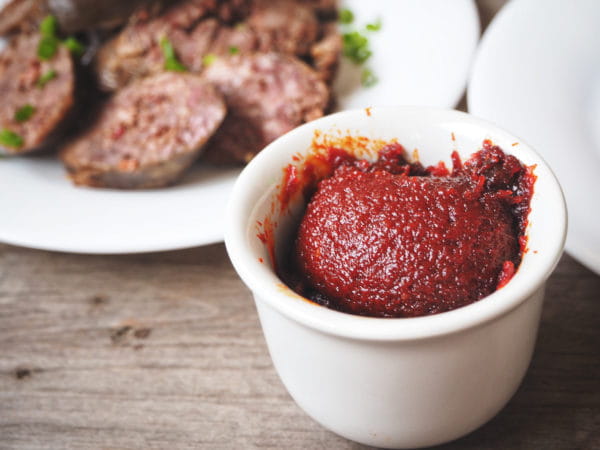The Mainstreaming of Organic
March 29, 2018
Get the full report here!

With more than 82% of U.S. households purchasing, organic has gone from unique to nearly universal. We’ll explore the results from our proprietary survey into organic, which shows that 56% of consumers equate organic with health. It can be difficult to decipher the opportunities and the hurdles (like price and trust) in this space. We got you covered. Let’s dive in!
Organic—long thought as something sought only by food activists or the most die-hard natural foodies—became a mainstream practice for 82% of consumers. It’s now a nearly $50 billion market. Whether due to accessibility, education, personal health or environmental concerns, consumers are not only comfortable with purchasing organic, but it’s something they practice habitually. However, the market is not without challenges. Trust in manufacturers and cost are both concerns for shoppers across the nation.
Organic Is...
The US Department of Agriculture (USDA) requires certified organic foods to be “grown and processed according to federal guidelines addressing […] soil quality, animal raising practices, pest and weed control, and use of additives.”
Organic Is Not...
• 100% pesticide free unless specifically labeled
• Guaranteed to be healthier
More than 40% of consumers under age 45 claim that at least half of their food consumption is made up of organic items while older consumers are slower to embrace the value in organics. The typical organic consumer is younger, socially conscious and for them, organic is no longer a trend but a tradition across many categories.

Organic food sales have almost tripled in the past ten years and Millennials are a driving force. Exercising some powerful purchasing power, 45% claim that at least half of their shopping cart is organic food. More than 30% of them get a boost of self-esteem when they buy organic. Dig deeper and a health focus comes to light: 52% percent of Millennials eat more veggies than their parents and grandparents. Within this generation is a subgroup worth watching — Hispanic Millennials. About 54% of this group claims that half of their shopping basket contains organic items.
American Millennial parents are the largest purchasers of organic food. This is a group motivated by the welfare of their children, and the belief that organic is better for those kids. For Millennials, organic is synonymous with “quality”; 40% of these parents use quality as the primary guide for their product choice.
This perception is likely to be passed down to generations to come, and is already coming to light. As Generation Z begins to enter adulthood, they join Millennials in prioritizing health. They take small and frequent grocery visits, and fill their baskets with 1/3 organic goods. Both groups love to online shop and organic groceries are no different. Ecommerce’s potential will only grow as Gen Z does. Take the 40% of Millennials shopping online for groceries, it’s a percentage likely to grow.
Some Millennials have taken their passion for all things organic one step further by choosing to dig into organic farming themselves. Nationally, the number of farmers aged 35 and younger has been on the upswing particularly in rural areas like Maine where they’ve seen increases upwards of 40%.

Despite the increase in organic consumption, consumers still struggle with two large issues: trust in manufacturers and high costs.
More than 75% of American families trust the USDA “Certified Organic” seal.15 Yet consumers are still confused about what organic actually means. Younger consumers appear more comfortable with the meaning of organic while older consumers seem confused by its scope. Contributing to the complexity are undefined “natural” claims often perceived as synonymous with organic.
Even consumers who are dedicated organic shoppers have trust issues. The organic shopper who is buying more than ever is twice as likely to distrust large manufacturers than the shopper whose purchase patterns have not changed. And 36% of consumers who are purchasing more organic than before wish there were more options from global brands.17 As large manufacturers continue to scoop up small successful organic brands, it will be interesting to see if consumer attitudes and trust levels improve towards bigger brands. Authenticity is the key to success for big CPGs, especially if they don’t traditionally play in the organic space.
Adding fuel to the distrust fire are events such as latest recent report from the USDA’s Office of the Inspector General. This report revealed that the agency is not keeping up with reconciling standards between different countries for organic produce along with organic “crop laundering” where shipments of “organic” produce have made their way into the U.S. from countries not associated with clean organic policies. It’s no wonder that some consumers feel validated in their suspicion of the organic label, even if it’s certified.
Organic sourcing could be the next big organic conversation and could help contribute manufacturers building consumer trust. In the UK, the Soil Association has a new program to allow shoppers to track the source of their organic food with their smart phone. This “farm to fork” sourcing may end up in the U.S. soon.
• 56% of consumers believe that when a product carries an organic claim on the front of a package that it is better for them.
• 69% said price was more important than Organic when purchasing food or beverage products.
• 74% do not believe that natural and organic claims mean the same thing when it comes to purchasing food and beverage products.
• 52% are more trusting of a company whose products carry an organic claim than companies whose products do not.
• More than 80% are aware that organic is FDA regulated.
• More than 60% would view the lack of “Certified Organic” on a product claiming to contain organic ingredients as a barrier to purchase.
-Source: FONA International survey, 2018
Organic products are perceived as expensive. More than 60% of consumers say they would purchase more organic foods if they were less expensive.20 When comparing organic and price, price outweighs all for over 70% of consumers vs the 30% who prioritize organic.21 Higher income households choose organic more than other consumers.
For most consumers, organic’s value has to outweigh the cost, particularly for older consumers and younger families with children. As we’ve established, families with children are equate organic with quality. However, the number of households with children is declining so suddenly that the over-55 market actually is more important for organic brands. The percentage of households with children has declined from 32% to 27.6% since 2006 which doesn’t bode well for organic brands unless they broaden their market.
Older consumers are a harder sell on organic, particularly if the claim comes at a higher cost. A little education can go a long way. Organic brands can win older consumers with clear communication by the brands through packaging or other means. Why will purchasing your organic product benefit them in particular? If they understand that, they are more likely to accept the product’s higher price point.
A large majority (97%) of consumers purchase their organic food from brick-and-mortar stores.22 The offerings and selection for these consumers continues to grow; Aldi, Trader Joe’s, and Kroger are well-entrenched in the organic field. Beyond their ability to offer reasonable prices, these retailers are also increasing their focus on the experience of shopping organic in their stores. That’s something that will appeal to the premium-seeking organic consumer.
Adding to the competition, online sites like Amazon and Thrive Market make it easier and more cost-effective to go organic. Thrive Market is a site dedicated to organic food, beauty, cleaning and pet products for the whole house. And Amazon’s acquisition of Whole Foods will have significant impact on consumers’ accessibility to organic. Amazon recently announced free two-hour delivery to Prime customers in four key markets including Austin, Dallas, Virginia Beach, and Cincinnati with a $35 minimum. It’s only a matter of time before the whole country can have their organic fix delivered to them at home allowing them to skip a trip to the market all together.
Recent studies and future research into the health benefits from eating organic could help sway the 33% of consumers who say they would buy organic if it was shown to be healthier. A 2016 British study found that organic dairy and meat products contain about 50% more omega-3 fatty acids. Another study said organic food lowers the potential of antibiotic resistant bacteria. Obviously, further proof and research is needed, but further studies can move consumers to the organic side if there was clear evidence it could help support long-term health.
• For the glass – The craft beer market appealed to Millennials because of its storytelling nature and the authenticity associated with the sourcing. The organic wine market has fallen right in line, tempting Millennials with a good story and a tasty glass of wine.
• For the bowl – Baby food, for the first time, has been singled out as the one category parents prefer organic, even over whole fruits and vegetables.28 Getting into the game are celebrities like Jennifer Garner, who co-founded of an organic baby food company Once Upon a Farm.
• For a treat - Ironically, 31% of Millennials would love to see more organic foods tied to indulgence and 23% of families with more than two children concur.29 The healthy halo of organic gives consumers “permission to indulge.” Organic indulgence meets a sweet spot (no pun intended) for consumers.
Organic condiments are experiencing steady growth with some standout segments. It’s hard to ignore $57 million in sales and a one-year growth of 41%, but that’s exactly what the organic dips segment posted in 2016. Organic spices are also wowing with a 35% growth to $193 million in sales.
Becoming an organically certified farm is a difficult process, which is why the USDA is working with the Organic Trade Association on an approved transitional certification program. For brands not quite ready to commit to full-blown organic status or those in the process of obtaining it, the Organic Transitional label is a limbo of sorts for manufacturers. Companies like Kashi and General Mills are delving into such labeling — theirs is “Certified Transitional.” General Mills is working to help dairy farms make the transition over the next three years, approximately the length of time
For many consumers, organic means health, and organic means quality. If you are already a creator of organic products – how do you further prove that halo? How can you meet your consumers’ desire. When it comes to the demographics of the organic consumer, think on this: Yes, Millennial parents are the #1 purchasers — but households with children are declining. That makes the 55+ group essential for organic brands, from a numbers perspective. If you’re just dipping your toe in the organic pool, it can be difficult to narrow your focus. One clear takeaway is TASTE. It is the #1 attribute for consumers, universally.
Get the full report here.

Heading down your own organic certification trail? You need a worry-free, speed-focused path to launch your next organic product—no matter the category. We get it. FONA’s expert consumer insights and regulatory teams understand the labeling considerations, the organic consumer and market. We’ll deliver unparalleled consumer insight and the know-how to help mainstream your product.
From concept to manufacturing, we’re here for you — every step of the way. Fast track your organic product. Call 630.578.8600 to request a flavor sample or chat us up at www.mccormickfona.com/contact-mccormick-flavor-solutions/\
Sources in full report.

With more than 82% of U.S. households purchasing, organic has gone from unique to nearly universal. We’ll explore the results from our proprietary survey into organic, which shows that 56% of consumers equate organic with health. It can be difficult to decipher the opportunities and the hurdles (like price and trust) in this space. We got you covered. Let’s dive in!
It Happened
Organic—long thought as something sought only by food activists or the most die-hard natural foodies—became a mainstream practice for 82% of consumers. It’s now a nearly $50 billion market. Whether due to accessibility, education, personal health or environmental concerns, consumers are not only comfortable with purchasing organic, but it’s something they practice habitually. However, the market is not without challenges. Trust in manufacturers and cost are both concerns for shoppers across the nation.
Organic Is...
The US Department of Agriculture (USDA) requires certified organic foods to be “grown and processed according to federal guidelines addressing […] soil quality, animal raising practices, pest and weed control, and use of additives.”
Organic Is Not...
• 100% pesticide free unless specifically labeled
• Guaranteed to be healthier
Age Gap In Organic
More than 40% of consumers under age 45 claim that at least half of their food consumption is made up of organic items while older consumers are slower to embrace the value in organics. The typical organic consumer is younger, socially conscious and for them, organic is no longer a trend but a tradition across many categories.
LEADING THE ORGANIC CHARGE: MILLENNIALS

42% of Millennial parents are organic shoppers
Organic food sales have almost tripled in the past ten years and Millennials are a driving force. Exercising some powerful purchasing power, 45% claim that at least half of their shopping cart is organic food. More than 30% of them get a boost of self-esteem when they buy organic. Dig deeper and a health focus comes to light: 52% percent of Millennials eat more veggies than their parents and grandparents. Within this generation is a subgroup worth watching — Hispanic Millennials. About 54% of this group claims that half of their shopping basket contains organic items.
American Millennial parents are the largest purchasers of organic food. This is a group motivated by the welfare of their children, and the belief that organic is better for those kids. For Millennials, organic is synonymous with “quality”; 40% of these parents use quality as the primary guide for their product choice.
This perception is likely to be passed down to generations to come, and is already coming to light. As Generation Z begins to enter adulthood, they join Millennials in prioritizing health. They take small and frequent grocery visits, and fill their baskets with 1/3 organic goods. Both groups love to online shop and organic groceries are no different. Ecommerce’s potential will only grow as Gen Z does. Take the 40% of Millennials shopping online for groceries, it’s a percentage likely to grow.
...Join ’em
Some Millennials have taken their passion for all things organic one step further by choosing to dig into organic farming themselves. Nationally, the number of farmers aged 35 and younger has been on the upswing particularly in rural areas like Maine where they’ve seen increases upwards of 40%.

OBSTACLES IN ORGANIC
Despite the increase in organic consumption, consumers still struggle with two large issues: trust in manufacturers and high costs.
Manufacturer Trust
More than 75% of American families trust the USDA “Certified Organic” seal.15 Yet consumers are still confused about what organic actually means. Younger consumers appear more comfortable with the meaning of organic while older consumers seem confused by its scope. Contributing to the complexity are undefined “natural” claims often perceived as synonymous with organic.
Even consumers who are dedicated organic shoppers have trust issues. The organic shopper who is buying more than ever is twice as likely to distrust large manufacturers than the shopper whose purchase patterns have not changed. And 36% of consumers who are purchasing more organic than before wish there were more options from global brands.17 As large manufacturers continue to scoop up small successful organic brands, it will be interesting to see if consumer attitudes and trust levels improve towards bigger brands. Authenticity is the key to success for big CPGs, especially if they don’t traditionally play in the organic space.
Adding fuel to the distrust fire are events such as latest recent report from the USDA’s Office of the Inspector General. This report revealed that the agency is not keeping up with reconciling standards between different countries for organic produce along with organic “crop laundering” where shipments of “organic” produce have made their way into the U.S. from countries not associated with clean organic policies. It’s no wonder that some consumers feel validated in their suspicion of the organic label, even if it’s certified.
Organic sourcing could be the next big organic conversation and could help contribute manufacturers building consumer trust. In the UK, the Soil Association has a new program to allow shoppers to track the source of their organic food with their smart phone. This “farm to fork” sourcing may end up in the U.S. soon.
FONA Listens: Organic & Consumers, What We Discovered
• 56% of consumers believe that when a product carries an organic claim on the front of a package that it is better for them.
• 69% said price was more important than Organic when purchasing food or beverage products.
• 74% do not believe that natural and organic claims mean the same thing when it comes to purchasing food and beverage products.
• 52% are more trusting of a company whose products carry an organic claim than companies whose products do not.
• More than 80% are aware that organic is FDA regulated.
• More than 60% would view the lack of “Certified Organic” on a product claiming to contain organic ingredients as a barrier to purchase.
-Source: FONA International survey, 2018
PAYING A PRICE
Organic products are perceived as expensive. More than 60% of consumers say they would purchase more organic foods if they were less expensive.20 When comparing organic and price, price outweighs all for over 70% of consumers vs the 30% who prioritize organic.21 Higher income households choose organic more than other consumers.
For most consumers, organic’s value has to outweigh the cost, particularly for older consumers and younger families with children. As we’ve established, families with children are equate organic with quality. However, the number of households with children is declining so suddenly that the over-55 market actually is more important for organic brands. The percentage of households with children has declined from 32% to 27.6% since 2006 which doesn’t bode well for organic brands unless they broaden their market.
The number of households with children is declining so suddenly that the over-55 market actually is more important for organic brands.
Older consumers are a harder sell on organic, particularly if the claim comes at a higher cost. A little education can go a long way. Organic brands can win older consumers with clear communication by the brands through packaging or other means. Why will purchasing your organic product benefit them in particular? If they understand that, they are more likely to accept the product’s higher price point.
LOCATION, LOCATION, LOCATION
A large majority (97%) of consumers purchase their organic food from brick-and-mortar stores.22 The offerings and selection for these consumers continues to grow; Aldi, Trader Joe’s, and Kroger are well-entrenched in the organic field. Beyond their ability to offer reasonable prices, these retailers are also increasing their focus on the experience of shopping organic in their stores. That’s something that will appeal to the premium-seeking organic consumer.
Adding to the competition, online sites like Amazon and Thrive Market make it easier and more cost-effective to go organic. Thrive Market is a site dedicated to organic food, beauty, cleaning and pet products for the whole house. And Amazon’s acquisition of Whole Foods will have significant impact on consumers’ accessibility to organic. Amazon recently announced free two-hour delivery to Prime customers in four key markets including Austin, Dallas, Virginia Beach, and Cincinnati with a $35 minimum. It’s only a matter of time before the whole country can have their organic fix delivered to them at home allowing them to skip a trip to the market all together.
RESEARCHING THE HEALTH EFFECTS
Recent studies and future research into the health benefits from eating organic could help sway the 33% of consumers who say they would buy organic if it was shown to be healthier. A 2016 British study found that organic dairy and meat products contain about 50% more omega-3 fatty acids. Another study said organic food lowers the potential of antibiotic resistant bacteria. Obviously, further proof and research is needed, but further studies can move consumers to the organic side if there was clear evidence it could help support long-term health.
CATEGORY SNAPSHOT
Categories that Appeal to Millennials
• For the glass – The craft beer market appealed to Millennials because of its storytelling nature and the authenticity associated with the sourcing. The organic wine market has fallen right in line, tempting Millennials with a good story and a tasty glass of wine.
• For the bowl – Baby food, for the first time, has been singled out as the one category parents prefer organic, even over whole fruits and vegetables.28 Getting into the game are celebrities like Jennifer Garner, who co-founded of an organic baby food company Once Upon a Farm.
• For a treat - Ironically, 31% of Millennials would love to see more organic foods tied to indulgence and 23% of families with more than two children concur.29 The healthy halo of organic gives consumers “permission to indulge.” Organic indulgence meets a sweet spot (no pun intended) for consumers.
Dips and Condiments
Organic condiments are experiencing steady growth with some standout segments. It’s hard to ignore $57 million in sales and a one-year growth of 41%, but that’s exactly what the organic dips segment posted in 2016. Organic spices are also wowing with a 35% growth to $193 million in sales.
A Sidenote - Organic Transitional Label
Becoming an organically certified farm is a difficult process, which is why the USDA is working with the Organic Trade Association on an approved transitional certification program. For brands not quite ready to commit to full-blown organic status or those in the process of obtaining it, the Organic Transitional label is a limbo of sorts for manufacturers. Companies like Kashi and General Mills are delving into such labeling — theirs is “Certified Transitional.” General Mills is working to help dairy farms make the transition over the next three years, approximately the length of time
The Takeaways
For many consumers, organic means health, and organic means quality. If you are already a creator of organic products – how do you further prove that halo? How can you meet your consumers’ desire. When it comes to the demographics of the organic consumer, think on this: Yes, Millennial parents are the #1 purchasers — but households with children are declining. That makes the 55+ group essential for organic brands, from a numbers perspective. If you’re just dipping your toe in the organic pool, it can be difficult to narrow your focus. One clear takeaway is TASTE. It is the #1 attribute for consumers, universally.
Get the full report here.

You deserve more. Let's get started.
Heading down your own organic certification trail? You need a worry-free, speed-focused path to launch your next organic product—no matter the category. We get it. FONA’s expert consumer insights and regulatory teams understand the labeling considerations, the organic consumer and market. We’ll deliver unparalleled consumer insight and the know-how to help mainstream your product.
From concept to manufacturing, we’re here for you — every step of the way. Fast track your organic product. Call 630.578.8600 to request a flavor sample or chat us up at www.mccormickfona.com/contact-mccormick-flavor-solutions/\
Sources in full report.





